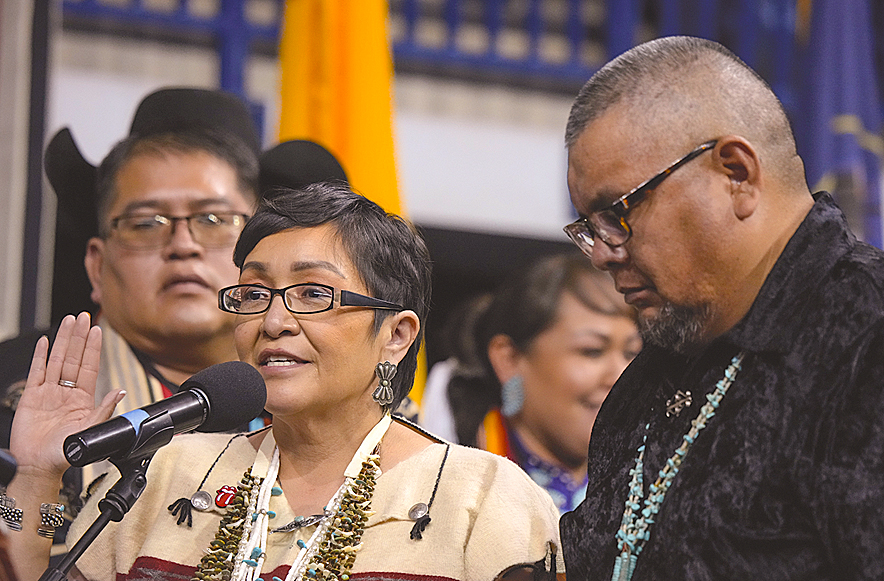
Looking back on 2023: Memories of a year with accomplishments, controversies

Navajo Times | Donovan Quintero
Richelle Montoya raises her right hand as she is sworn in as the new Navajo Nation Vice President during the Navajo Nation Inauguration Tuesday afternoon at the Fighting Scouts Event Center in Fort Defiance. Montoya’s husband, Olsen Chee, accompanied her.
WINDOW ROCK – Every year, as the calendar year draws to a close, we at the Navajo Times look back at our published newspapers and compile stories for our year-end edition.
The editorial staff decided it would choose one story for each month that stood out and resonated most with readers in 2023.
The result is a mix of brawls, high court rulings, demonstrations, Missing and Murdered Indigenous Peoples, floods, the Nygren Administration, among a list of others.
January
‘Nhich’ą́ą́h na’ashhaał dooleeł’
Richelle Montoya sworn in as next vice president
Richelle Montoya was sworn in as vice president of the Navajo Nation, becoming the first Diné woman to hold the office.
As hundreds of people watched, Montoya raised her right hand, face steeled, and placed her hand on a Bible, which her husband, the first second gentleman Olsen Chee held for her.
February
Full steam ahead for freshman Council
The 25th Navajo Nation Council had a full plate in February, when the delegates were not assigned to Council committees.
The Council already had several challenges ahead of it.
Two Diné magistrate judges take oath of office
McKinley County Court held a swearing-in ceremony for McKinley County judges Virginia Yazzie and Brent Detsoi.
March
Former controller not guilty
The Navajo Nation’s former top financial officer was found not guilty on five charges. An eight-member Navajo jury acquitted former Controller Pearline Kirk, said David R. Jordan, her attorney. Kirk was accused of misrepresenting information on a company hired to do rapid COVID-19 testing in the Nation.
Kirk was terminated from her employment as Controller in May 2021, when persecutors first filed complaints against her.
Arizona v. Navajo Nation, which gets the water?
The Navajo Nation headed to the Supreme Court to present arguments as to why the Nation needed its water rights met by the U.S. government.
Frederick Liu, representing the federal parties, opened the oral argument by recognizing the tribe has every right to water. Still, it didn’t have the right to ask the government to consider its water, create a plan, and execute it.
April
100 years of controversial laws
Celebrating a centennial of government, the Navajo Nation continues to move forward to represent its people, but some laws created in the past did the opposite.
In honor of 100 years of the Navajo Nation Council, the Navajo Times reported on the centennial in the April 13 edition of the Navajo Times.
May
Erin Toadlena-Pablo is Gallup’s new police chief
First Diné woman leading Na’nízhoozhí police department
Gallup has a new police chief. Her name is Erin Toadlena-Pablo, who became the first Diné woman to lead the city’s police force at a critical moment.
Toadlena-Pablo is Naakaii Dine’é and born for Tódích’íi’nii. Her maternal grandfather is Dibé Łizhiní, and her paternal grandfather is Kinyaa’áanii. She was born in Sawmill, Arizona.
June
While the brawl at Leupp planning meeting story takes the cake in June, the following stories also made headlines.
Haaland’s ‘freeze’
The Interior Department will withdraw public lands around Chaco Canyon from new oil and gas leasing for 20 years.
The Biden Administration on June 2 blocked new oil and gas leasing on federal land around Chaco Canyon, a culturally significant Native American site.
Interior Secretary Deb Haaland announced that the Interior would withdraw public lands within a 10-mile radius of Chaco Canyon and the area around it, following through on a 2021 pledge by President Biden to protect the area from drilling.
Eight Navajo communities surround the checkerboard area of Chaco Canyon, with just about a thousand Diné residing within those boundaries. Those community members raised their concern with the 10-mile “freeze”
Big victory for ‘Indian Country’
The U.S. Supreme Court on June 15 upheld the Indian Child Welfare Act, a 1978 law, aimed at keeping Native American adoptees with their tribes and traditions, handing a victory to tribes.
By a vote of 7 to 2, the justices rejected the challengers’ claim that the requirement was a form of unconstitutional racial bias against Natives.
Specifically, the ICWA targeted the forcible removal of Native children from their homes and restricted the adoption process. When Congress passed the act, it wanted to uphold the best interests of those Indigenous children but also keep in mind the preservation and history of tribes.
Before the ICWA, many Native children were being wrongfully taken from their homes and placed into adoption agencies.
July
Navajo-Hopi relocation still impacting Navajo families in 21st century
The pain of forced relocation still burns in the hearts of many Diné. Thirty-seven years ago, Diné families faced eviction in the Hopi Partitioned Lands because of the federal government, which told them they had to leave their homes by July 6, 1986.
But Diné are still struggling with the aftereffects of forced relocation. Today, Diné families still reside on HPL.
The tragedy resulted from modern federal Indian policy, causing untold hardship for thousands of Diné who found themselves homeless and landless.
August
Diné families evicted from red-tagged downtown Gallup apartments
Nine Diné families had a rude awakening on July 26, when they were informed by officials from the City of Gallup that they had 24 hours to vacate the premises because of substandard living conditions.
The families were residents of the Hill Street Apartment complex, located at 107 E. Hill Ave., near downtown Gallup. The property is owned by Gallup attorney David Jordan.
‘For all’ Diné veterans
Billy-Upshaw christens USNS Navajo in Louisiana
Jocelyn Billy-Upshaw christened the USNS Navajo with a bottle of “perfectly aged” André champagne from California.
Wearing a clear poncho over her biil and fine dootł’izhii and béésh łigaii, Billy-Upshaw, the USNS Navajo sponsor and the 2006-07 Naabeehó Bich’eekį, smashed the bottle against the newly minted ship berth in the Intracoastal Waterway in Houma, Louisiana.
The USNS Navajo is a towing, salvage and rescue ship bearing the name Navajo. The ceremony took place at Bollinger Shipyards in Houma.
September
Yazzie family finally experiences justice served
Justice arrived for Diné homicide victim Jamie Lynette Yazzie in September.
Yazzie disappeared from Piñon, Arizona, on June 30, 2019. On the Hopi Reservation, her body was found seven miles away on Nov. 23, 2021. She had been shot in the back of her head.
Tre James of Piñon was arrested on Aug. 4, 2022, and indicted on nine counts of domestic violence by the U.S. Attorney’s Office – District of Arizona.
On Sept. 12, James went to trial for nine counts.
October
Treated like animals
Chinese workers file lawsuit against inhumane treatment
A group of Chinese immigrants allege they were tricked by the owners of an illicit cannabis operation in Shiprock with promises they would be cutting flowers or doing farm work for a decent wage, according to a lawsuit in Santa Fe County court.
The 15 immigrants, the plaintiffs, brought the suit on Sept. 27 in the First Judicial District Court, saying they were coerced by guards with firearms who kicked, cursed, and barely fed them, to work 14-hour days sitting on upside-down buckets in stuffy hotel rooms trimming illegally grown marijuana.
Central to the lawsuit are defendants Irving Rea Lin and Dineh Benally, two of the “chief principals” of the operation.
November
Former Bennett Freeze Area residents still waiting
Part I
Lavonnia Begay, 63, grew up near White Mesa, where some residents still live in poor housing and home conditions after Bennett Freeze, a 1966 development ban that former U.S. Commissioner of Indian Affairs Robert L. Bennett imposed on 1.5 million acres of land claimed by the Navajo and the Hopi. The land dispute dragged on for 40 years, preventing around 8,000 Diné in the nine chapters from repairing and running utilities to their homes, and building schools – unless the Hopi Tribe approved the improvements. And open businesses and build schools.
December
‘Up in arms’
Former Nygren staffers say appointees have ‘no experience’
Worried about being audited more than anything else, President Buu Nygren’s administration staff members were “up in arms” at the Council Chamber during the fall session, according to former Nygren staffers.
The Navajo Times asked George Hardeen, Nygren’s spokesman, for the administration’s spending records (since Nygren took office in January), including all charges made by P-card holders, and budget at least seven times since Dec. 4. The Navajo Times has not received the administration’s tightly guarded financial information as of Dec. 13.








 Highway 264,
Highway 264, I-40, WB @ Winslow
I-40, WB @ Winslow